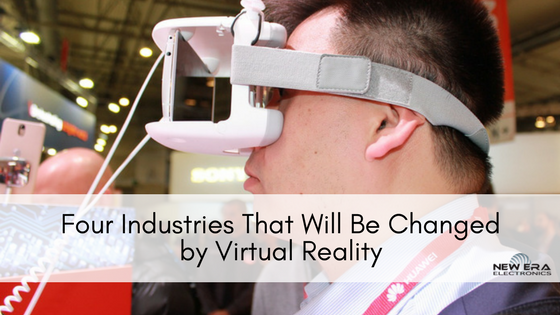
Four Industries That Will Be Changed by Virtual Reality
Blog
 Potential is no longer limited to the reality we live in. Virtual reality is the way ahead for so many industries and businesses. What started as a concept that many thought was clunky and gimmicky, or was limited to the realm of sci-fi, now stands side-by-side with the IoT as the most exciting modern advancement in computing technology.
Potential is no longer limited to the reality we live in. Virtual reality is the way ahead for so many industries and businesses. What started as a concept that many thought was clunky and gimmicky, or was limited to the realm of sci-fi, now stands side-by-side with the IoT as the most exciting modern advancement in computing technology.
Interacting with a computer-generated simulation of a three-dimensional image or environment is going to revolutionize so much of our lives. Helmets, goggles, gloves and other VR possibilities are already being realized through technology like the Oculus Rift, the HTC Vive, the Sony Playstation VR, and the SulonQ. But the tech is not merely for games.
So, where do we see virtual reality for industry breaking down barriers and making radical changes to the way things are done?
Education
In the classroom, people learn much about the world around them. However, it isn’t without its obvious limitations. But imagine sitting in a geography class and, with the aid of VR glasses, being transported to a walking tour of Rome. It could also be a history class, or art, or literature, or a travel agency training session, or police training, you name it. We humans learn so much through visual means and VR provides immersive educational opportunities for a fraction of the cost, time and risk. The learning potential is huge. Expect to see VR technology soon as a standard part of schools, universities, colleges, training centres and more. Picture the potential for teaching and learning in medicine, engineering, astronomy, social studies, art, music, history, and so much more.
Healthcare
We mentioned medicine, but only from the educational viewpoint. Surgery in recent years has made great strides in becoming less invasive and dangerous. Alongside keyhole surgery and its instruments fitted with cameras and fiber optics, VR will enable doctors to get an even better look at what’s going on inside a patient. A doctor may even get a detailed 3D view of a patient’s organs before the scalpel is even lifted. Then there’s the opportunity to go “inside” the microscope and examine molecules and cells closely.
VR will also enable further advancement in carrying out procedures from remote locations. Soon, patients may be worked on by the best in the world – from across the world.
Real Estate
Soon, people won’t necessarily have to go out to view a property. Thanks to the photos and videos already used in online listings and “virtual tours”, donning virtual reality equipment will enable people to “stand” inside and look around. This will be a huge selling point for realtors and a big timesaver as buyers/renters pick and choose which places they actually want to visit and inspect.
Trades
In addition to wearable VR technology, augmented reality (AR) is also making its way into trades and heavy industry in the form of smart glasses and smart helmets. Technicians and workers can keep their hands free to carry out repairs or procedures while seeing instructions and guides in their field of view. VR and AR technology will enable supervisors to communicate live and overlay images and instructions from remote locations, thus improving safety. AR and VR is also helping with job training. Altogether it represents huge savings in risk and expense.
Virtual reality for industry is making our world more accessible and comprehensible. Expect the wave of VR and AR to turn into a tsunami. Ensure your industry is riding that wave’s crest all the way by partnering with an electronics supplier and architect to integrate your entire operation.
Creative Commons Attribution: Permission is granted to repost this article in its entirety with credit to New Era Electronics and a clickable link back to this page.




